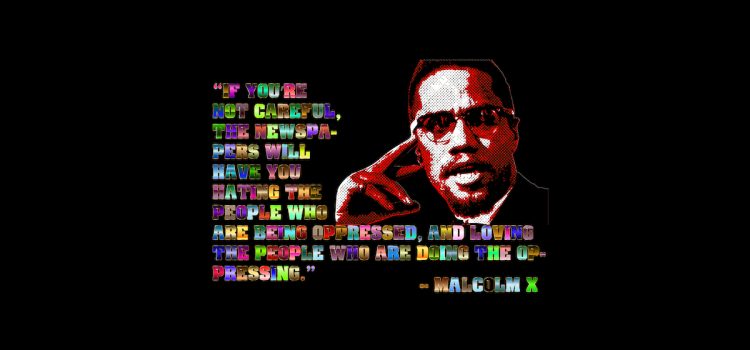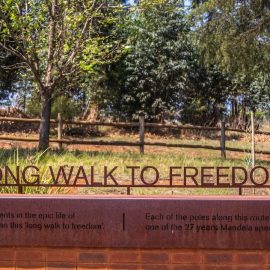

This article is an excerpt from the Shortform book guide to "The Autobiography of Malcolm X" by Malcolm X and Alex Haley. Shortform has the world's best summaries and analyses of books you should be reading.
Like this article? Sign up for a free trial here.
What were Malcolm X’s political beliefs? How did his approach differ from that of Martin Luther King, Jr., and other civil rights leaders?
Malcolm X was critical of the American civil rights movement and its more moderate leaders. Coming from his perspective of the Nation of Islam (and later Islam), he advocated a different approach through strategies of separatism, self-defense, & pan-Africanism.
Continue reading to learn about Malcolm X’s political beliefs in the context of civil rights and Black liberation.
Malcolm X’s Political Beliefs
Malcolm X believed that civil rights victories were negligible and that Black people shouldn’t be content to gain their freedom piece by piece. He also explains that he thought much of the movement, including the March on Washington (a civil rights protest led by Martin Luther King, Jr.), was performative—it quieted discord but didn’t result in any meaningful changes, partially because it accepted white people’s money (and therefore influence) and sought white people’s approval. Malcolm X’s political beliefs were reflected in a more radical approach to Black liberation, and he believed that the Nation of Islam should participate in civil rights action in order to prove the efficacy of radicalism.
(Shortform note: The relationship between Malcolm X and Martin Luther King, Jr., has often been characterized as adversarial—but some evidence suggests that this rivalry may sometimes have been exaggerated. First, the historical record shows that each made strides toward understanding and identifying with the other’s position on civil rights activism over time. Second, it was recently discovered that Alex Haley (who collaborated with Malcolm X on this autobiography) misrepresented King’s view of Malcolm X in a famous published interview. He quoted King as claiming that Malcolm X had ultimately hurt the pro-Black movement when King actually seemed to suggest that while they disagreed, Malcolm X may not have been wrong.)
Black Separatism
One part of this radical approach was Black separatism—Malcolm X believed that the races should be kept economically and culturally separated. He explains that he believed this because, in his eyes, integration did more harm than good for Black people: Black people wanted to be free of white people, who were uniformly evil, and to have a chance to form their own self-sufficient communities. He also believed that integration would necessarily lead to interracial marriage, which would produce multiracial children and ultimately destroy both races.
(Shortform note: Malcolm X expanded on the difference between racial separation and segregation in a speech: Separatism requires Black self-sovereignty, while under segregation, Black people remain under the control of white people. Although the federal government ultimately mandated integration, the US remains racially segregated—neighborhoods usually comprise one race—and some experts have observed that Black separatist groups are gaining in popularity because of increased racial resentments over the last decade. On the other hand, interracial marriage has become more common and more popularly approved of since its legalization in 1967.)
Self-Defense & Even Violence
Another part of this radical approach was self-defense against racism, by way of violence if necessary. Male members of the Nation of Islam were enrolled in a program called the Fruit of Islam—the Nation of Islam’s security division—where they’d be trained in self-defense tactics like judo. Malcolm X believed that this was necessary because white people had continually perpetrated violence against Black people; furthermore, he explains that not only did he believe that Black people had a right to protect themselves, but also that it would be morally wrong for them not to defend themselves against white violence.
(Shortform note: Some experts argue that the right to self-defense has always been racialized, especially when it comes to gun ownership (note, though, that the Fruit of Islam was unarmed). White people’s right to own and use guns for self-defense remains uncontested, especially when they say they’re defending themselves from a Black person. In contrast, Black people have been denied the right to own guns for most of American history and are often still presumed criminals when they’re armed. However, Black Americans’ gun ownership has risen dramatically since 2020, resulting from a cultural spike in anti-Blackness that drove home the need for self-defense.)
Pan-Africanism
In 1964, Malcolm X went on a pilgrimage to Mecca. After his pilgrimage was over, he traveled around the Middle East for a while. He discussed the plight of US racism with everyone who would listen—poor people and nobles, people of all colors, who were astonished, sad, and angry to hear about these conditions. He explains that this made him start thinking about how isolated from the rest of the non-white world Black Americans were—and how powerfully world-changing such international connections might be. This led him to venture to Africa.
Malcolm X says that, first, he traveled to Nigeria, where he made several public appearances to discuss Black liberation. In one address, he spoke on the necessity of including Black Americans in the pan-African movement—an initiative intended to unite people of African ancestry around the globe, no matter where they now lived. He also argued that free African nations should bring the issue of American racism to the United Nations’ attention. After Nigeria, he traveled to Ghana, where he was invited to speak to the Ghanaian parliament about the need for pan-Africanist support of Black Americans. Then, he traveled to Liberia, Senegal, and Morocco to learn more about how Black people lived across Africa.
(Shortform note: Pan-Africanism was new to Malcolm X, but it wasn’t a brand new idea. According to experts, the pan-African movement was popularized in the US around the end of World War I by W.E.B. DuBois, a pre-eminent sociologist and Black liberationist of the early 20th century, who recognized that colonized Africans and marginalized Black Americans had a lot in common politically. Beginning in the 1990s, the pan-Africanist sentiment was countered by Afro-pessimism (an intellectual tradition that focuses on anti-Black violence), which emphasizes the differences—and increases the cultural distance—between Africans and Black Americans.)

———End of Preview———
Like what you just read? Read the rest of the world's best book summary and analysis of Malcolm X and Alex Haley's "The Autobiography of Malcolm X" at Shortform.
Here's what you'll find in our full The Autobiography of Malcolm X summary:
- Malcolm X explains why he believed what he believed
- The historical and sociological context surrounding Malcolm X’s life
- Why Malcolm X was such a controversial figure






